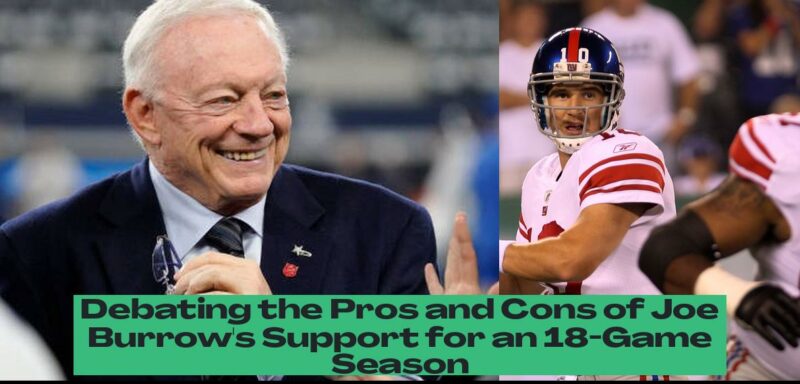Former NFL QB Rips into Joe Burrow’s 18-Game Stance: A Controversial Take
The NFL world was thrown into a whirlwind of debate when Cincinnati Bengals quarterback Joe Burrow expressed his support for an 18-game regular season. This seemingly innocuous statement sparked a firestorm of criticism, particularly from former NFL quarterback Chase Daniel, who took to Twitter to condemn Burrow’s stance. Daniel, known for his long and storied career as a backup quarterback, voiced his strong disagreement, arguing that the current NFL schedule is already grueling and adding another game would only exacerbate the issue of player fatigue and injuries.
Daniel’s tweet, which quickly went viral, asserted that “every NFL player seeing this is NOT happy with Burrow for saying this.” He further stated that the NFL Players Association (NFLPA) was already engaged in damage control meetings, highlighting the widespread disapproval among players regarding Burrow’s proposal. This public backlash underscores the deeply rooted sentiment among NFL athletes that the current schedule is already demanding enough, and adding another game would be detrimental to their well-being.
The debate surrounding an 18-game season is not new. It has been a recurring topic of discussion for years, with proponents arguing for increased revenue and a more competitive schedule. However, the players’ perspective, particularly from veteran players like Daniel, has consistently emphasized the physical and mental toll of an already demanding season. The potential for increased injuries and burnout has been a major point of contention, leading many players to oppose the expansion of the regular season.
Burrow’s stance, while seemingly driven by a desire for a more competitive and entertaining league, has inadvertently placed him at odds with a significant portion of his fellow NFL players. His comments have ignited a debate that goes beyond the mere addition of a game, delving into the fundamental concerns regarding player health, safety, and the overall balance between entertainment and athlete well-being.
The controversy surrounding Burrow’s comments serves as a stark reminder of the complex interplay between the business side of the NFL and the interests of the players. While adding a game could potentially generate substantial revenue, it comes at a cost that may be too high for many players to bear. The NFLPA’s involvement in damage control signifies the seriousness of the situation and the potential for a wider rift between players and league officials.
Dissecting Joe Burrow’s 18-Game Proposal: A Deeper Dive
The controversy surrounding Joe Burrow’s 18-game stance raises a multitude of questions about the future of the NFL. Is an extended season the answer to a more exciting and competitive league? Or will it ultimately result in a detrimental impact on player health and well-being? To understand the complexities of this debate, it’s essential to dissect the arguments for and against an 18-game season.
- Former NFL quarterback Chase Daniel criticized Joe Burrow’s support for an 18-game regular season, highlighting concerns about player fatigue and injuries.
- Daniel’s tweet expressing disagreement with Burrow’s stance quickly went viral, reflecting widespread disapproval among NFL players.
- Veteran players like Daniel emphasize the physical and mental toll of the current NFL schedule, opposing the expansion to an 18-game season due to concerns about increased injuries and burnout.
- Joe Burrow’s advocacy for an 18-game season has sparked a debate within the NFL community, revealing differing perspectives on player well-being versus revenue generation.
- The controversy surrounding Burrow’s comments underscores the delicate balance between the business side of the NFL and the interests of its players.
The Case for an 18-Game Season: A Lucrative and Competitive Proposition
Proponents of an 18-game season often cite the potential for increased revenue and a more competitive league as primary arguments. The addition of two extra games would generate significant revenue for the NFL, both through ticket sales, broadcast rights, and merchandise. This financial windfall could be used to further invest in the league, improving facilities, player salaries, and overall infrastructure. Furthermore, expanding the schedule to 18 games would theoretically create a more competitive league by providing more opportunities for teams to compete and potentially make the playoffs.
The argument for a more competitive league is based on the idea that more games would allow for a greater separation between teams, creating a clearer picture of the best teams in the league. It would also offer more opportunities for underdog teams to make a run for the playoffs, potentially leading to more exciting and unpredictable outcomes. The prospect of more games and more opportunities to prove themselves could also motivate players to push themselves harder, leading to a higher level of overall play.
However, while the financial benefits and increased competitiveness are enticing, they come with inherent risks that must be carefully considered. The potential for increased injuries and player burnout is a major concern, and the potential negative impact on player health and well-being cannot be ignored.
The Case Against an 18-Game Season: A Strain on Player Health and a Risk to the Game
Critics of an 18-game season argue that the current schedule is already too demanding on players, and adding two more games would be a recipe for disaster. They point to the high rate of injuries in the NFL, which is already one of the most physically demanding sports in the world. Adding more games would undoubtedly increase the risk of injuries, potentially leading to more players missing games and a decline in the overall quality of play.
Furthermore, critics argue that an 18-game season would lead to increased player burnout. Playing more games would inevitably lead to more practices, more travel, and more time away from family and friends. This added strain on players would likely lead to decreased performance and a higher risk of injuries, ultimately harming the overall quality of the game. The potential for player burnout could also contribute to a decline in player morale and a less enjoyable experience for both players and fans.
The debate over an 18-game season is a complex one, with valid arguments on both sides. It’s essential to consider the potential benefits and drawbacks before making any decisions. The well-being of the players must be a top priority, and any changes to the schedule must be carefully considered to ensure the long-term health and sustainability of the NFL. Ultimately, the decision of whether or not to implement an 18-game season rests with the league and the players’ union, who must carefully weigh the potential benefits and risks before making a decision.
The Impact on Player Health and the NFL’s Responsibility
The debate over an 18-game season goes beyond the realm of entertainment and revenue; it delves into the realm of player safety and well-being. The NFL, as a multi-billion dollar industry, has a responsibility to ensure the health and safety of its players, who are the lifeblood of the game. The potential for an 18-game season to exacerbate the already challenging injury landscape in the NFL is a serious concern that cannot be ignored.
The NFL has implemented various safety measures over the years, including rule changes and advancements in medical technology. However, the inherent physicality of the game and the relentless nature of the schedule continue to pose a significant risk to players’ health. Adding two more games to the season would undoubtedly increase the risk of injuries, potentially leading to a higher incidence of chronic conditions such as concussions, arthritis, and back problems.
The NFL’s commitment to player safety is constantly under scrutiny, and the debate over an 18-game season highlights the ongoing tension between the league’s financial interests and the well-being of its players. It is crucial for the NFL to prioritize the health and safety of its athletes, and any decisions regarding schedule changes must be made with the utmost consideration for the potential consequences on player well-being.
The NFL must also engage in open and honest dialogue with its players, acknowledging their concerns and working together to find solutions that balance the needs of the game with the health and safety of its athletes. This collaborative approach is essential for maintaining the integrity of the game and ensuring that the NFL continues to be a source of entertainment and inspiration for fans around the world.
The Future of the NFL: Striking a Balance Between Entertainment and Player Well-being
The controversy surrounding Joe Burrow’s 18-game proposal has highlighted a critical issue facing the NFL: the need to strike a delicate balance between entertainment and player well-being. The league has a responsibility to provide fans with a thrilling and engaging product, but it must also prioritize the health and safety of its athletes.
The future of the NFL hinges on its ability to navigate this complex issue. The league must find ways to ensure that the game remains exciting and competitive while also safeguarding the health of its players. This will require a collaborative effort from the league, the players’ union, and the fans.
Open communication and transparency are crucial to finding solutions that work for everyone. The NFL must engage in meaningful dialogue with its players, listening to their concerns and working together to find ways to mitigate the risks associated with the game. The league must also be transparent with fans, explaining the rationale behind its decisions and addressing their concerns about player safety.
Ultimately, the future of the NFL depends on its ability to create a sustainable and equitable environment for both players and fans. This will require a commitment to player safety, a focus on innovation, and a willingness to adapt to the evolving landscape of sports. The NFL has a rich history and a bright future, but it must be mindful of the challenges ahead and work diligently to create a league that is both exciting and responsible.








